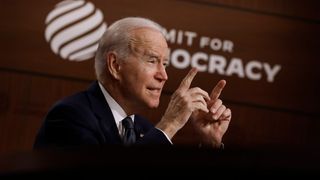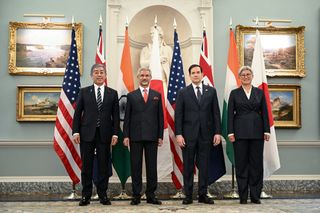Last Monday, Samantha Mostyn was sworn in as Australia’s 28th governor-general. Given what has been unfolding this week in the United Kingdom, France and the United States, it was nice for a change to see an advanced democracy work without upheaval.
In days before the Canberra ceremony, it seemed clear US President Joe Biden would conclude he should step aside from his re-election campaign. The first presidential debate with Republican nominee Donald Trump had been a disaster. Biden completely failed to make the case for what he stood for and where he would take the country over the next four years. He failed to take Trump down for his extremism, his support for those who attacked the Capitol on January 6, 2021, and for his compulsive lying whenever challenged on past actions or statements – such as his comment that those who served and died in the armed forces were “suckers and losers.” Throughout the event, Trump gloated at the man he has consistently mocked as being unable to string two sentences together.
Most analysts had expected Biden to roar out of the gate, attack Trump’s radical policy proposals and unfitness for office and present the American people with a stark choice between himself and his rival. It never materialised. Trump had free rein to lie for 90 minutes about everything from abortion (Democrats would “rip the baby out of the womb in the ninth month”) to a country that is “going to hell” and failing on the world stage. Trump turned the debate into a referendum on Joe Biden – a referendum the president lost.
A chorus of leading voices in the media demanded Biden leave the field. Joe Scarborough, whose Morning Joe breakfast program Biden watches regularly, was the first to abandon the man he had long championed. Tom Friedman, of The New York Times, who has a long relationship with Biden and has his attention especially in relation to the crises in the Middle East, was blunt: “I watched the Biden–Trump debate alone in a Lisbon hotel room, and it made me weep. I cannot remember a more heartbreaking moment in American presidential campaign politics in my lifetime, precisely because of what it revealed: Joe Biden, a good man and a good president, has no business running for re-election.”
The editorial board of The New York Times and the broadsheet’s Never Trump conservative columnist Bret Stephens were searing. The Atlanta Journal-Constitution, which is very influential in the battleground swing state of Georgia, weighed in.
By Monday morning, however, it was not at all clear that Biden was retiring. The Biden family was at Camp David over the weekend in advance of the July 4 Independence Day holiday. The word from the mountain top was the family was united and resolute in urging Biden to stay the course. As one person in attendance told The Washington Post, “You have a bad night. Bad nights end. We’re still here. Let’s go.”
Biden’s closest adviser, Ted Kaufman, told The New York Times, “He has a hell of record. I think he should stay. He is the best president in modern history.”
What was also apparent in the following days was that no senior elected Democratic official was yet prepared to say publicly that Biden had to leave the race. Not one member of the House or Senate Democratic leadership. Not one governor or member of the cabinet was urging Biden to leave the field.
“I cannot remember a more heartbreaking moment in American presidential campaign politics in my lifetime, precisely because of what it revealed: Joe Biden, a good man and a good president, has no business running for re-election.”
The damnable conundrum is staring everyone in the face.
First, if Biden stays in the race, there is no clear road map to victory.
The latest polls this week show Trump leading Biden by six points, 48-43 (The New York Times / Siena), and 48-42 (The Wall Street Journal), with 74-80 per cent of voters in both polls saying Biden is too old for the job. Biden’s approval rating appears stuck in the high 30 per cent range at best. He remains at grave risk in the key swing states – Pennsylvania, Michigan, Wisconsin, Nevada, Arizona and Georgia – where the election will be won or lost.
Democrats in the House who have been on the cusp of retaking that chamber are now afraid they will fall short with Biden at the top of the ticket. Senate Democrats, already facing a likely turnover of that chamber to the Republicans, share that fear.
If Republicans control all of congress in 2025, Trump as president will have a virtually free hand to execute his agenda of vengeance and retribution.
Biden has yet to outline the campaign strategy that will bring victory in November. E. J. Dionne, of US think tank Brookings and a columnist with The Washington Post, wrote the day after the debate, “Biden needs to do a series of televised interviews, including many in less than friendly settings. He’ll have to step up his campaign appearances, offering more speeches along the lines of his energetic performance in North Carolina.” In 1992, when Bill Clinton was reeling from a sex scandal just before the New Hampshire primary, he and Hillary went on 60 Minutes. Clinton survived New Hampshire and went on to win the Democratic nomination as the “Comeback Kid." Biden needs to be the Comeback Geezer.
Given the issue is Biden’s age, and he is not Benjamin Button, another major lapse at a public event is entirely likely. The reaction will be irredeemably harsh. There will be more demands that Biden immediately retire from the field.
The second part of the conundrum is that if Biden leaves the race there is no clear road map to victory.
There is a view that an open process in choosing Biden’s successor would be exactly what is needed to revitalise the party for the election. Ira Shapiro, a former Senate staffer and senior official in the Clinton administration, tells me: “The argument for staying the course is that there is no choice; the alternative, at this late date, is chaos in the Democratic coalition ensuring Trump’s victory. In my view, the alternative, if Biden withdrew, would be excitement, and several months in which millions of Americans, who hate our political system and the choice of presidential candidates they are facing, would see it revitalised.
“Of course, there are practical challenges for the Democrats finding a different nominee. But they can be handled, and they would be overwhelmed by the electrifying nature of events."
A very senior Democratic campaign strategist disagrees. “But generally Democratic elected [leaders] are in a box. If Biden gets out, [Vice President Kamala] Harris is in the strongest position to take over and that scares them as much as trying to muddle through with Joe. In some ways she is his safety net with Democratic elites.
“So what needs to happen – a withdrawal, then a new, energetic nominee; we have plenty of talent – is tough to see happening. If you pass over Harris for someone else, especially a white guy, you’ll have an explosion with the Black base, denying the first Black woman VP her rightful place.”
What happens next?
If it is safer, overall, to stay with Joe, it’s also clear Biden alone is not enough.
The president needs something to happen to Trump that is at least as serious in scale as the catastrophe at the CNN debate. There are several reset moments coming for the Republican candidate.
The Supreme Court’s ruling this week that he enjoys immunity for his official acts as president ensures there will be no trial before the election on Trump’s role in the January 6 insurrection. Sentencing for his hush money and election corruption crimes in New York has been delayed to September 18, as the impact of the immunity decision is so far unclear – but it will prolong the spectacle of Trump as a convicted felon.
Trump will shortly select his vice-president. Several previous choices have bombed. In 2008, Alaska governor Sarah Palin was more famous as a Saturday Night Live meme than as a serious vice-president for John McCain, who lost that election. How wisely will Trump choose?
For Joe Biden, though, what was already challenging – his age and the lack of voter enthusiasm for his campaign – has become exceptionally painful.
Australia’s democracy is much more capable of handling leadership setbacks than America’s. If a deep question of fitness erupted with the prime minister, he or she would be forced to step down as leader within days. Also, the Westminster system does not allow blow-ins to lead the country. Pauline Hanson will never be prime minister. Nor will Clive Palmer or Twiggy Forrest.
But in America, democracy is not working well. Trump’s dominance to date is undiminished.









